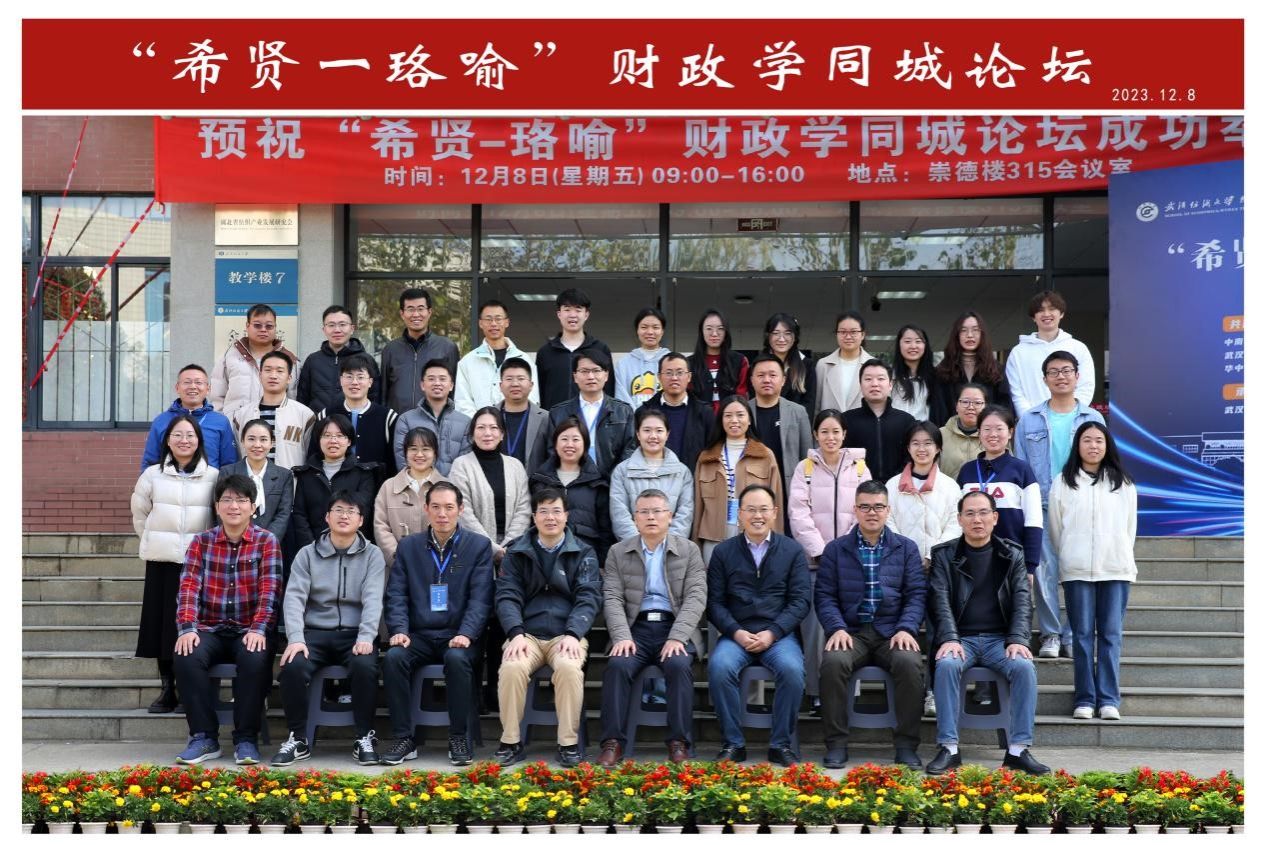In order to promote academic exchanges and cooperation in the field of finance, and improve the level of talent training, scientific research and discipline construction of finance disciplines in colleges and universities in the city. On December 8, 2023, the fifth "Xixian Luoyu" Finance City Forum was successfully held in Conference Room 315, School of Economics, Wuhan Textile University. The forum consists of the School of Finance and Taxation of Zhongnan University of Economics and Law, the Innovation and Talent Introduction Base of Income Distribution and Modern Finance Discipline of Zhongnan University of Economics and Law, the Department of Finance and Taxation of the School of Economics and Management of Wuhan University, the Research Center of Finance and Finance of Wuhan University, the Department of Finance and Financial Management of the School of Management of Huazhong University of Science and Technology The School of Finance and Public Management of Hubei University of Economics and the School of Economics of Wuhan Textile University jointly launched.

The opening ceremony of the conference was presided over by Dean Duan Dingqiang. In his speech, he warmly welcomed the arrival of all experts and scholars, reviewed the development process of our financial discipline, and emphasized that the development of finance and taxation will rely on the characteristics of the school industry, serve the development of the school industry, seize the opportunities of transformation and upgrading, tackle difficulties and integrate, and achieve new development of disciplines, new teaching methods, and exchange new ideas.
Subsequently, Yang Jie, the director of human resources of Jiangzhidu Finance and Taxation Group, on behalf of the founder Xu Xinsheng, the chairman of the board, reported on the topic of "Analysis of talent quality model in the context of intelligent finance and taxation", which was deeply discussed by experts and scholars present at the meeting. Zhang Kezhong, Dean of the School of Finance and Taxation of Zhongnan University of Economics and Law, said that in the era of artificial intelligence, the focus of discipline construction in response to changes in talent demand should be to understand the needs of the market and enterprises, so that the courses mastered by students keep pace with changes in technology; Wei Tao, Dean of the School of Finance and Public Management of Hubei University of Economics, pointed out that we should strengthen the construction in the transformation of disciplines, the training program of experimental classes and the change of employment direction, focus on improving the quality of students, and reduce the substitutability; Gong Feng, director of the Department of Finance and Taxation of Wuhan University, believes that finance and economics disciplines should adapt to the changes of the times, follow the trend and integrate existing resources to promote the development of new finance and economics; Luo Guang, Professor of the Department of Finance and Financial Management of Huazhong University of Science and Technology, stressed that the teachers of the college reorganized the department, and the breaking and restructuring of teaching work played an important role in the future teaching direction; Dean Duan Dingqiang highly praised the speeches made by the experts attending the meeting, and thanked them again for gathering wisdom, sharing experience and enlightening thinking.

At the forum, eight young scholars, Ouyang Jie of Zhongnan University of Economics and Law, Zhu Ling of Huazhong University of Science and Technology, Li Ziming of Wuhan University, Bao Yongwen of Wuhan Textile University, Xu Yang of Hubei University of Economics, Zhuang Jialin of Zhongnan University of Economics and Law, Zhang Haotian of Wuhan University, and Zhao Kui of Huazhong University of Science and Technology, Information Friction, Budget Supervision and Government Expenditure Efficiency, Financial Pressure and Labor Investment Efficiency, People oriented Shantytown Reconstruction: Enlightenment and Public Policy for Slum Upgrading in India, Government Subsidies and Enterprise Innovation Performance: Impact Effects and Mechanism, Financial Power, Administrative Power and Long term Economic Growth - Evidence from Chinese History (- 221 - 1911) The theme of Tax System Reform and Modern Industrialization - Evidence from the "Reform of the Tax System", Tax Collection and Management Upward Shift and Government Subsidy Income: Evidence from the Consolidation of National and Local Taxes, and Tax Assistance to Enterprises: Empirical Evidence from the Reform of Value Added Tax Invoices were presented. The eight speakers are all experts and scholars in the field of finance and taxation, focusing on key issues and research hotspots in the field of finance, and acutely put forward new academic views and constructive opinions. After the presentation of each paper, participants had in-depth exchanges and discussions on topics, empirical strategies, models, variable settings, and mechanisms of action. Among them, Associate Professor Bao Yongwen of our institute reported on the topic of Government Subsidies and Enterprise Innovation Performance: Impact Effect and Mechanism, and elaborated the impact effect, mechanism and heterogeneity of government subsidies on innovation performance of Chinese manufacturing enterprises, which has positive enlightenment and reference value for policy makers to improve and optimize financial subsidies to support enterprise innovation.
The successful holding of this forum not only brings together the latest research achievements and academic views of many experts and scholars, but also realizes interdisciplinary academic exchanges and interactions, builds a bridge for academic exchanges and cooperation between universities, and also provides a platform for scholars in the field of finance to share research achievements, broaden academic horizons, and stimulate innovative thinking. In the future academic exchanges and cooperation, it is believed that the "Xixian Luoyu" Finance Local Forum will play an important role in disciplinary progress, knowledge sharing and academic upgrading, and promote the vigorous development of finance discipline.